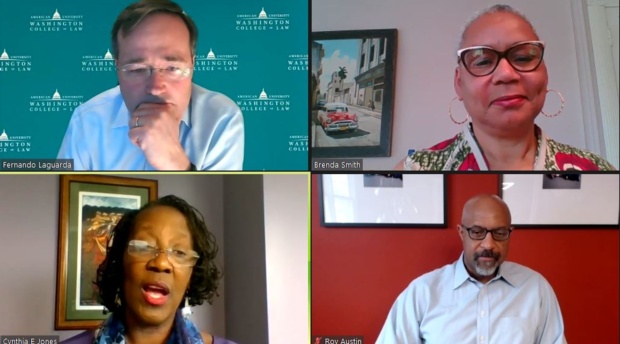Program on Law and Government Hosts Virtual Panel on Criminal Justice Policy and Reform
June 23, 2020
On June 23, American University Washington College of Law’s Program on Law and Government presented “Defund the Police? Mapping a Reform Agenda,” discussing the ways in which criminal justice reform can be obtained.

The virtual panel featured Roy Austin, former deputy assistant to President Barack Obama for the Office of Urban Affairs, Justice and Opportunity, who also served as deputy assistant Attorney General for the Civil Rights Division and as assistant United States attorney in Washington, DC; AUWCL Senior Associate Dean for Faculty and Academic Affairs and Professor Brenda Smith, co-director of the Community Economic Development Law Clinic and director of the Project to Address Prison Rape, who previously served on the National Prison Rape Elimination Commission; and AUWCL Professor Cynthia E. Jones, director of the law school’s Stephen S. Weinstein Trial Advocacy and Program, president of The Sentencing Project Board of Directors, and chair of the Board of the Civil Rights Corps. The discussion was moderated by Program on Law and Government Director Fernando Laguarda.
“Defund the police is fundamentally about limiting or divesting in police power,” explained Jones, who served as executive director of the Public Defender Service for the District of Columbia prior to joining the WCL faculty. “The police in this country have too much power over citizens.”
Austin, a partner at Harris, Wiltshire & Grannis LLP, presented a number of instances of police involvement in criminal behaviors and how each respective department responded, beginning with the attack of Rodney King by Los Angeles police in 1991.
“I want to tell you this is about more than a couple of ‘bad apples,’” Austin said. “This is a systemic problem that goes through pretty much all of policing, and that is the inability of officers to see a fellow officer do something wrong, and to do anything about it.”
Smith noted that discussions of defunding or divesting from the police should include all law enforcement, citing that that her work on sexual abuse by corrections officers against those in custody connects to the bigger issue of holding law enforcement accountable.
“The big part of my work is to make it clear that there are established principles and standards, and that there are constitutional obligations for abuse of people with law enforcement authority,” Smith said, adding that the data show agencies that acknowledge and record abuses by corrections officers do an overall better job at addressing victimization in custody.
“We’re talking about a criminal justice system that gives the police an unprecedented amount of power over us, and that power comes from the Supreme Court and the Fourth Amendment,” Jones said, noting that in this way, the justices decide what is determined a reasonable or unreasonable seizure. “An arrest, or when police engage in stop and frisk, are seizures, and they are unreasonable if the police abuse their power.”
Giving police a smaller mandate, and divesting and defunding some of their activities, would help, Jones argued. Steps to take include removing police from schools, decreasing police traffic infractions, and creating a safety net of additional community resources.
“If we divested the millions of dollars that we’re investing in huge police departments and expecting them to handle all these socio-economic problems, and invest a portion of that money in addressing those issues, we would be safe – it is not a scenario where we need to choose between over-policing and danger to the community. We can have both,” Jones said.
For more information about the Program on Law and Government, visit wcl.american.edu/impact/initiatives-programs/lawandgov.